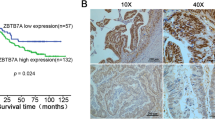Abstract
Objects
To explore the roles of growth factor receptor-bound protein 14 (GRB14) in colorectal cancer (CRC) and its correlation with clinicopathological characteristics and prognosis of CRC patients.
Results
GRB14 was localized in the cytoplasm of CRC and benign glandular epithelium cells, showing higher levels in CRC tissues compared with normal colon samples (P < 0.001). High GRB14 was associated with a high pathological grade (P = 0.045), advanced clinical stage (P = 0.018), enhanced tumor invasion (P < 0.001) and lymph node metastasis (P = 0.028). The cancer genome atlas (TCGA) mRNA sequence data showed that GRB14 was upregulated in CRC at an advanced clinical stage (P = 0.011) with enhanced tumor invasion (P < 0.001) and lymph node metastasis (P = 0.014). Kaplan–Meier survival curves revealed that CRC patients with high GRB14 levels had a shorter survival compared with those showing low GRB14 expression (P = 0.007). High GRB14 expression was an independent prognostic factor for CRC patients (HR 2.847, 95 %CI 1.058–7.659; P = 0.038).
Conclusions
GRB14 may be an important cancer promoter that enhances CRC progression. Upregulated GRB14 levels may predict a poor clinical outcome in CRC patients.


Similar content being viewed by others
References
Balogh K, Asa SL, Zheng L, Cassol C, Cheng S, Ezzat S (2012) The insulin resistance Grb14 adaptor protein promotes thyroid cancer ret signaling and progression. Oncogene 36:4012–4021
Cai C, Chen JY, Han ZD, He HC, Chen JH, Chen YR, Yang SB, Wu YD, Zeng YR, Zou J, Liang YX, Dai QS, Jiang FN, Zhong WD (2015) Down-regulation of dual-specificity phosphatase 5 predicts poor prognosis of patients with prostate cancer. Int J Clin Exp Med 3:4186–4194
Cariou B, Bereziat V, Moncoq K, Kasus-Jacobi A, Perdereau D, Le Marcis V, Burnol AF (2004) Regulation and functional roles of Grb14. Front Biosci 9:1626–1636
Daly RJ, Sanderson GM, Janes PW, Sutherland RL (1996) Cloning and characterization of GRB14, a novel member of the GRB7 gene family. J Biol Chem 21:12502–12510
Depetris RS, Hu J, Gimpelevich I, Holt LJ, Daly RJ, Hubbard SR (2005) Structural basis for inhibition of the insulin receptor by the adaptor protein Grb14. Mol Cell 20:325–333
Finak G, Bertos N, Pepin F, Sadekova S, Souleimanova M, Zhao H, Chen H, Omeroglu G, Meterissian S, Omeroglu A, Hallett M, Park M (2008) Stromal gene expression predicts clinical outcome in breast cancer. Nat Med 5:518–527
Han DC, Shen TL, Guan JL (2001) The Grb7 family proteins: structure, interactions with other signaling molecules and potential cellular functions. Oncogene 44:6315–6321
Huang O, Jiang M, Zhang X, Xie Z, Chen X, Wu J, Liu H, Shen K (2013) Grb14 as an independent good prognosis factor for breast cancer patients treated with neoadjuvant chemotherapy. Jpn J Clin Oncol 11:1064–1072
Ikeda T, Jinno H, Shirane M (2007) Chemosensitivity-related genes of breast cancer detected by DNA microarray. Anticancer Res 27:2649–2655
Li X, Liang L, Huang L, Ma X, Li D, Cai S (2015) High expression of protein phosphatase 4 is associated with the aggressive malignant behavior of colorectal carcinoma. Mol Cancer 14:1–13
Reis-Filho JS, Simpson PT, Turner NC, Lambros MB, Jones C, Mackay A, Grigoriadis A, Sarrio D, Savage K, Dexter T, Iravani M, Fenwick K, Weber B, Hardisson D, Schmitt FC, Palacios J, Lakhani SR, Ashworth A (2006) FGFR1 emerges as a potential therapeutic target for lobular breast carcinomas. Clin Cancer Res 22:6652–6662
Rosa PR, Bohrer RC, De Cesaro MP, Gutierrez K, Ferreira R, Pereira GR, Oliveira JF, Goncalves PB (2014) Growth factor receptor-bound protein 14: a potential new gene associated with oocyte competence. Zygote 22:103–109
Torre LA, Bray F, Siegel RL, Lortet-Tieulent J, Jemal A (2015) Global cancer statistics, 2012. CA 65:87–102
Wang GH, Yao L, Xu HW, Tang WT, Fu JH, Hu XF, Cui L, Xu XM (2013) Identification of MXRA5 as a novel biomarker in colorectal cancer. Oncol Lett 2:544–548
Zhou Y, Wu J, Fu X, Du W, Zhou L, Meng X, Yu H, Lin J, Ye W, Liu J, Peng H, Liu R, Pan C, Huang W (2014) OTUB1 promotes metastasis and serves as a marker of poor prognosis in colorectal cancer. Mol Cancer 13:1–14
Acknowledgments
The present study was supported by the Grant from National Natural Science Foundation of China (81272556).
Author information
Authors and Affiliations
Corresponding author
Ethics declarations
Conflict of interest
None.
Rights and permissions
About this article
Cite this article
Yang, P., Wei, J., Li, W. et al. High expression of growth factor receptor-bound protein 14 predicts poor prognosis for colorectal cancer patients. Biotechnol Lett 38, 1043–1047 (2016). https://doi.org/10.1007/s10529-016-2077-4
Received:
Accepted:
Published:
Issue Date:
DOI: https://doi.org/10.1007/s10529-016-2077-4




